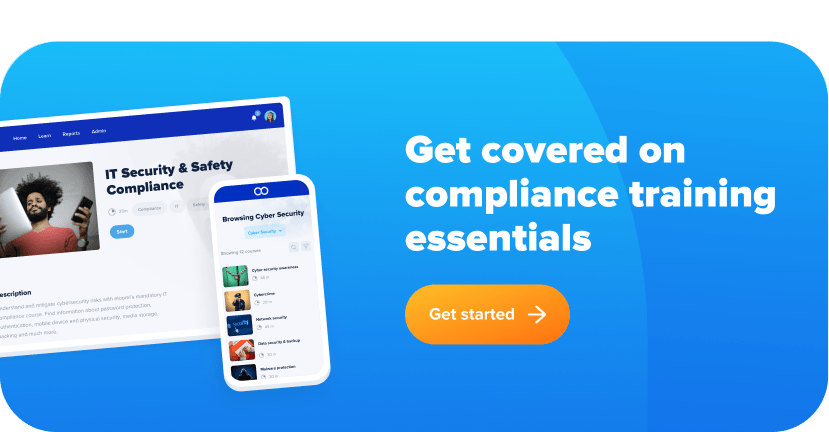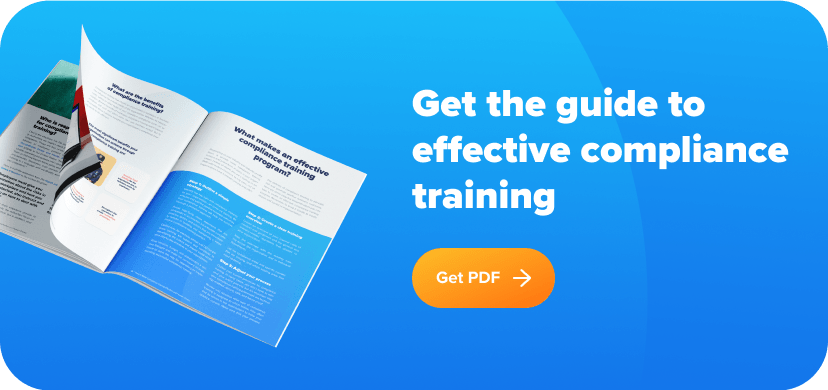What it is: Sexual harassment training is intended to prevent unwanted sexual behavior in the workplace.
Why it matters: It builds awareness of what constitutes sexual harassment and seeks to reduce the likelihood of your business suffering negative consequences from unwanted sexual harassment, keeping your workplace happier, healthier, and more cohesive.
Sexual Harassment Training: Required or Not?
Not at the federal level but maybe at your individual state level.
Whether you’re required to give sexual harassment training will depend on where your employees live and work. With today’s remote workforce environment, you may have employees who live and work in a state different from where your business is located. You’ll need to comply with all of those state laws.
Even in states where you’re not required to provide sexual harassment training, your company can be held liable for any sexual harassment. If you provide training, you may have an affirmative defense that limits or entirely removes your liability.
The closest the federal government comes to mandating compliance training for all companies across all industries is for sexual harassment. The Equal Employment Opportunity Commission (EEOC) and the U.S. Supreme Court have strongly encouraged sexual harassment training and stressed its importance. But neither has taken the step to formally require such training.
Compliance Recommendation: This article is focused on sexual harassment training for all your employees. You should also provide a separate training to your managers that teaches them how to handle sexual harassment allegations and potentially inappropriate discussions.

What Sexual Harassment Training Includes
As a business owner or people department representative, you can’t ignore sexual harassment. Few states require you train your employees on the topic, but even if your state doesn’t, it’s a good idea to set the foundation for what makes up sexual harassment. Doing so could also give your company a good legal defense, should you face any sexual harassment complaints.
Defining Sexual Harassment
The first thing your training should cover is exactly what is sexual harassment. Here is our recommended definition:
Sexual harassment occurs when one employee, manager, or supervisor has experiences unwelcomed sexual advances, requests for sexual favors, or any other verbal, written, electronic, or physical conduct of a sexual nature that affects an individual’s employment, unreasonably interferes with their ability to perform their work, or creates an intimidating, hostile, or offensive work environment.
This definition, while long, covers both types of sexual harassment: quid pro quo and hostile work environment. Quid pro quo (Latin for “this for that”) sexual harassment often occurs when a manager or supervisor requests sexual favors from an employee contingent on a raise, promotion, or other work-related matter. A hostile work environment is often created when one employee regularly makes sexual comments or advances toward another. If required by your state, check to see if they give you a specific definition of sexual harassment.
Your training should also clarify that anyone can be a victim of sexual harassment. Employees of any gender, as well as customers or clients, could be potential victims.
State Requirements
Remember, this applies to more states than just where your business is located. You’ll need to know the requirements for every state where you have employees. As of the publication date, the following states mandate sexual harassment training for employers in their state:
- California (for employers with 5 or more employees in the state)
- Connecticut (for employers with 3 or more employees in the state)
- Delaware (for employers with 50 or more employees in the state)
- Illinois (for employers with 1 or more employees in the state)
- Maine (for employers with 15 or more employees in the state)
- New York (for employers with 1 or more employees in the state)
Each of these states has different requirements for what needs to be included in your training, how often you need to give it, and how to record that every employee attended. Review your state guides for information on how to stay compliant where your employees liv

Recommended training
Anti-harassment & anti-discrimination
In states where sexual harassment training isn’t required, this training can take its place while including additional topics. If you are required to provide sexual harassment training, it’s good to keep that separate and documented.
Anti-harassment and anti-discrimination training define workplace harassment, bullying, and discrimination. It will cover strategies for preventing such workplace behavior as well as how to deal with violations. When you clearly define what is considered unacceptable behavior, you hold all employees to the same standard, which is a form of anti-discrimination in itself.
Diversity
Diversity and inclusion efforts by businesses have increased dramatically in recent years. This training will provide your employees with insight about their own biases—both known and unknown—and how to counter them to work effectively with colleagues from varying backgrounds.
Diversity training often goes hand in hand with anti-harassment training. It also includes details on how to operate in a more inclusive environment, welcoming people from different faiths, cultures, abilities, and beliefs.
Workplace safety
Safety training will vary depending on your industry. If you operate in a traditional office environment, your training will focus more on ergonomics, first aid, fire safety, and rendezvous points in case of emergency.
However, in more hazardous industries and professions, your workplace safety training may be more intense, and it may be required. For example, if you operate in the construction industry, you may be required to provide certain OSHA safety training.
Data protection & privacy
You might think this only applies to companies who collect and store customer or client data. Think again. In today’s work environment, you collect and store your employees’ data on a regular basis. If you offer retirement benefits, you’re collecting confidential information about each enrolled employee.
This training will show you the difference between personally identifiable information and publicly shared data. It will also show you how to properly collect and store the data, and how to restrict employee access so a breach is less likely. Your employees want to know that the data you have on them is safe and, by having this training, you’ll convey the steps you take to achieve that goal.

Healthcare
Related to data protection and privacy, healthcare training is vital to any business. The Health Insurance Portability and Accountability Act (HIPAA) limits health information that can be disclosed without a patient’s consent.
This training is crucial for employers who offer health insurance to their employees. Running afoul of HIPAA can lead to serious fines but it also reduces the trust your employees have in you, making it more likely that you’ll soon deal with higher employee turnover and reduced productivity.
Human resources
Human resources (HR) training is one training that’s specifically designed for one group of employees, instead of everyone. Even if your HR department is small, your business will benefit from HR training so you can scale more effectively.
HR training ensures your company handles complaints appropriately, keeps records correctly, handles payroll accurately, and manages employee performance effectively among the many other tasks HR is solely responsible for doing and overseeing. Regulations abound for HR and employment laws. Your HR team must understand and follow these regulations accurately to reduce your company’s risk.
State-specific
As noted, every state has slightly different requirements for compliance training. This makes it even more crucial that you train your employees on the nuances of your state’s laws. That’s also what makes state-specific training so much more in-depth. There are countless sub-trainings that may be necessary, depending on your industry and the types of workers you have.
For every state, from employees to executives, you’ll need to ensure everyone understands the rules they need to follow. This is your company’s path to an affirmative defense.
What’s an affirmative defense?
We’ve mentioned this term a couple of times so let’s discuss it for a brief moment. An affirmative defense is a defense an employer can support through evidence which, if credible, will reduce or eliminate the employer’s liability.
Let’s consider an example. You have a supervisor who’s created a hostile work environment for an employee because of sexual harassment. If the employee did not engage in sexual behavior with the supervisor and was fired, demoted, or received any other adverse action, your company has no defense.
However, if no adverse action was taken against the employee and you can prove the following, you may prevail and reduce or eliminate your company’s liability:
- Your company provided both supervisor and employee sexual harassment training
- Your company reasonably tried to prevent and promptly correct the sexual harassment behavior
- The employee failed to reasonably take advantage of corrective opportunities provided by your company
Your next steps
Get best-in-class anti-harassment training in place with eloomi
Training is proactive. If you train your employees incorrectly, you’re to blame and will bear the burden of the consequences. If you fail to train your employees on training required by your state, you’ll bear the burden of the consequences. To make matters worse, training requirements and employment laws are constantly changing.
It’s important that you take proactive steps to ensure your employees are properly trained on required and recommended training necessary for them to do their jobs. To help you, partner with a training platform that does the hard work for you, so you can focus on your core business needs.
Get in touch to explore compliance training solutions and make sure your compliance training is up to date to help guide and support your employees.







